The Jewish Road Podcast
Many Christians struggle to make sense of the Old Testament, or quietly wonder if it still matters. Many Jewish people have never seriously considered Jesus. But what if the two parts of the story were never meant to be separated? Hosted by Jewish followers of Jesus, Matt and Ron Davis, this podcast connects the Hebrew Scriptures with the hope of Messiah found in the New Testament. We tell the story of Israel and help Israel tell her story. God made a promise. God keeps His promises. He’s not done with Israel. And neither are we.
Many Christians struggle to make sense of the Old Testament, or quietly wonder if it still matters. Many Jewish people have never seriously considered Jesus. But what if the two parts of the story were never meant to be separated? Hosted by Jewish followers of Jesus, Matt and Ron Davis, this podcast connects the Hebrew Scriptures with the hope of Messiah found in the New Testament. We tell the story of Israel and help Israel tell her story. God made a promise. God keeps His promises. He’s not done with Israel. And neither are we.
Episodes

Thursday Feb 06, 2025
Bring Them Home or End the War? - Why Israel''s Answer Is Both
Thursday Feb 06, 2025
Thursday Feb 06, 2025
Welcome back to Season 7 of The Jewish Road Podcast! If you’ve ever watched Fiddler on the Roof, you know the classic scene - Tevye, the village milkman, listens to two men argue, nods at the first and says, “You’re right.”
Then he hears the other side and says, “You’re right.”
A bystander protests, “They can’t both be right!” And Tevye, caught in the tension, sighs, “You’re also right.”
That’s Israel today. Stuck between two truths - both undeniably right, both in direct conflict.
On one side, Israel must do everything possible to bring home the hostages taken by Hamas. It’s not just strategic; it’s a sacred, deeply ingrained Jewish value.
On the other side, Hamas must be defeated decisively, or this will happen again. Over and over.
So, what’s the right answer? Like Tevye’s dilemma, both are right. And that’s the tension Israel - and the Jewish world - wrestles with today.
Key Takeaways
The Jewish Value of Life: Israel’s relentless pursuit of hostage rescue is rooted in Pidyon Shvuyim - the ancient Jewish principle of redeeming captives.
The Threat of Hamas: If not stopped, Hamas will continue using hostage-taking as leverage, forcing Israel into impossible choices.
Living in the Tension: The paradox of war - how do you fight when your enemy hides behind civilians?
Wisdom in Holding Contradictions: In Jewish thought, struggling with opposing truths isn’t a weakness - it’s what it means to be Israel, “one who wrestles with God.”
Chapter Markers
[00:00] – Fiddler on the Roof and the art of holding two truths[04:30] – Israel’s hostage dilemma and the principle of Pidyon Shvuyim[10:15] – The danger of negotiating with terrorists[15:40] – The impossible choices Israeli leaders face[20:55] – The bigger geopolitical shifts at play[30:10] – What this means for the future of Israel and the Jewish world[40:00] – What’s coming this season on The Jewish Road Podcast
This season, we’ll be tackling big questions, real tensions, and biblical insights that bring clarity to confusing times.
We’ve got some incredible conversations lined up with Israeli insiders, faith leaders, and historians who will help us unpack what’s happening on the ground.
- Follow the podcast to stay in the loop.- Leave a five-star review (we’d love to hear your thoughts!).- Share this episode with someone who needs a clear, grounded perspective on Israel today.- Visit TheJewishRoad.com for more resources, articles, and upcoming events.
Until next time - Sha'alu shalom Yerushalayim. Pray for the peace of Jerusalem. Shalom.
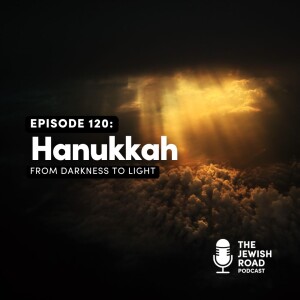
Tuesday Dec 24, 2024
Hanukkah: From Darkness to Light
Tuesday Dec 24, 2024
Tuesday Dec 24, 2024
In our final episode of 2024, we reflect on the historical, biblical, and prophetic significance of Hanukkah - the Festival of Lights.
Together, we explore the story of the Maccabean Revolt, the rededication of the temple, and how God’s faithfulness preserved the Jewish people so the Messiah could come. We also uncover the deeper meaning of Hanukkah, connecting the light of the menorah to Yeshua, the Light of the World.
This season invites us all to rededicate our lives to God and embrace His faithfulness as we step into a new year.
Key Takeaways:
God’s Faithfulness in History: Hanukkah reminds us of the Maccabees’ victory over Antiochus IV Epiphanes and God’s preservation of His covenant people.
The Temple’s Rededication: After its desecration, the Jewish people restored the temple, marking it with an eight-day celebration that still shines brightly today.
A Greater Miracle: Hanukkah represents more than the oil lasting eight days—it’s about God protecting His people so the Messiah’s arrival could be fulfilled.
The Messiah and Hanukkah: Jesus celebrated Hanukkah, as recorded in John 10, pointing to Himself as the ultimate Light and fulfillment of God’s promises.
A Season of Renewal: Just as the temple was rededicated, we are called to rededicate ourselves to God, becoming lights in a world that desperately needs His hope.
Chapter Markers:0:00 – Wrapping up 2024: Hanukkah and the Messiah.5:10 – Exploring the Maccabean Revolt and God’s deliverance.15:30 – The rededication of the temple and the Festival of Lights.23:00 – Jesus and Hanukkah: Understanding John 10.30:15 – Rededicating our lives to God in this season.38:50 – Gratitude and hope as we look ahead to 2025.
As we celebrate Hanukkah and Christmas together, let’s pause to reflect on God’s unchanging faithfulness and His call for us to be lights in this world. Let’s embrace this season as a time to rededicate ourselves to Him, just as the temple was rededicated so many years ago. Join us at the https://thejewishroad.com/hanukkah for resources to bring Hanukkah into your home and connect with the Jewish roots of your faith. Together, we can shine His light and pray for the peace of Jerusalem. Sha'alu Shalom Yerushalayim!

Monday Dec 16, 2024
God With Us: Immanuel, Ezekiel, and the Presence of the Lord
Monday Dec 16, 2024
Monday Dec 16, 2024
In this episode of The Jewish Road Podcast, we dive into the book of Ezekiel to explore a recurring and profound theme: God's desire to be known.
From the judgment and restoration of Israel to the millennial kingdom, the presence and glory of God are woven throughout Ezekiel’s prophecies.
We unpack how God’s glory, which once departed from the temple, will one day return in fullness, fulfilling His promises to Israel and the nations.
As the world celebrates the birth of Jesus, this episode offers a timely reflection on God's sovereignty, His promise of restoration, and the hope of His glorious return.
Key Takeaways:
God's Desire to Be Known: Ezekiel emphasizes God's longing for His people, Israel, and the nations to know Him, with the phrase "then they will know that I am the Lord" appearing 77 times between chapters 5 and 39.
The Glory of God Departs and Returns: Ezekiel recounts the gradual departure of God's glory from the temple, a result of Israel's sin, but also prophesies its ultimate return during the millennial kingdom.
The Presence of God in Jesus: The incarnation marks the return of God’s glory in human form - God taking on flesh to dwell among us.
Millennial Temple and Kingdom: Ezekiel’s vision of the millennial temple highlights a new era where God's presence will dwell in a transformed Jerusalem, fulfilling His promises to Israel and the nations.
A God Who Wants to Be Known: From the Exodus to the incarnation, God's actions reveal His deep desire for humanity to recognize Him and live in His presence.
Chapter Markers:
0:00 – Introduction: Exploring God’s presence in Ezekiel.2:15 – The phrase "then they will know that I am the Lord" and its significance.10:32 – God's glory departs from the temple in Ezekiel’s vision.16:45 – The incarnation: The glory of God returns in Jesus.23:10 – Ezekiel’s vision of the millennial temple and the return of God’s glory.30:20 – Reflections on God's presence during the Christmas and Hanukkah season.35:00 – Final thoughts: Worshiping a God who desires to be known.
As we celebrate this season, take a moment to reflect on God’s presence in your life. Dive into Ezekiel chapters 40-48 and consider His promises of restoration and glory. Don’t let the busyness of the holidays distract you - pause and recognize the God who longs to be known. Share this episode with someone who needs encouragement, and let’s continue to pray for the peace of Jerusalem. Shalom!
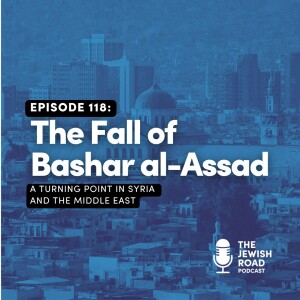
Wednesday Dec 11, 2024
The Fall of Bashar al-Assad: A Turning Point in Syria and the Middle East
Wednesday Dec 11, 2024
Wednesday Dec 11, 2024
The Assad regime in Syria has fallen after decades of brutal rule, leaving the region and the world watching closely. What does this mean for Israel, for the Middle East, and for God’s timeline? In this episode of The Jewish Road Podcast, we explore the implications of this seismic shift. From Iran’s crumbling “Shiite corridor” to Israel’s strategic moves in the Golan Heights, we unpack the geopolitical and spiritual consequences of this historic event.
But this isn’t just about politics - it’s about the unfolding of biblical prophecy. As the Middle East shifts, what role do Christians play in standing with Israel? And how can we be watchful, prayerful, and active in these critical times? Join us as we dig deep into what this moment means for the nations and for God's ultimate plan.
Key Takeaways:
The fall of the Assad regime marks a dramatic shift in Middle Eastern dynamics, creating both opportunities and dangers.
Iran's influence is diminishing as its proxies like Hezbollah face setbacks, but new threats could emerge in Syria’s power vacuum.
Biblical prophecy, such as Isaiah 17 and Zechariah 12, points to the significance of these events in God’s timeline.
Christians have a biblical mandate to stand with Israel as God’s chosen people and play an active role as watchmen in these times.
Chapter Markers:
0:00 – Introduction: The fall of the Assad regime in Syria.
5:12 – Historical context: Assad's brutal reign and its collapse.
12:45 – Israel’s response: Strategic moves in the Golan Heights.
18:20 – Iran’s unraveling: Impact on Hezbollah and the “Shiite corridor.”
25:30 – Biblical lens: Prophecies from Isaiah and Zechariah.
33:50 – The role of Christians: Standing with Israel and engaging in prayer and action.
40:15 – Final thoughts: Watchfulness, boldness, and trusting in God’s plan.
This is a critical moment for Israel and the nations. Let’s stay watchful, prayerful, and bold in support of God’s people. As always, we encourage you to stand as a light, a voice, and a blessing. For more insights and updates, subscribe to The Jewish Road Podcast and join us in praying for the peace of Jerusalem. Shalom Yerushalayim.
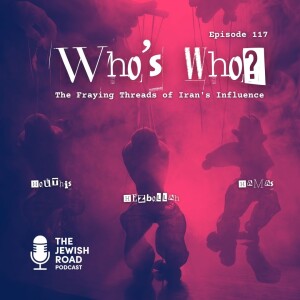
Tuesday Nov 26, 2024
Who's Who: Houthis, Hezbollah and Hamas
Tuesday Nov 26, 2024
Tuesday Nov 26, 2024
Who’s Really Pulling the Strings in the Middle East?
The Middle East is a puppet show of chaos, with Houthis, Hamas, and Hezbollah commanding attention. But these groups are just the actors - who’s the puppet master behind it all?
In this episode, we take you behind the scenes to explore the power dynamics at play. Iran stands as the director of this global drama, but is there an even greater force working behind the curtain?
We unravel the tangled threads of these terror groups, their shocking origins, and the roles they play in a larger theopolitical battle.
From advanced rocket systems to covert sabotage missions, this episode sheds light on how Israel is navigating an unrelenting war.
If you’ve ever wondered why peace feels impossible in this region, this conversation is your front-row seat to the truth.
Key Takeaways
The Houthis, Hamas, and Hezbollah are key players in a larger battle orchestrated by Iran.
Iran’s influence is more visible than ever, with advanced weapons, funding, and strategic manipulation at its core.
Israel’s defense systems, like the Iron Dome, are saving lives, but the threat remains relentless.
This isn’t just geopolitics - it’s a theopolitical battle with spiritual implications.
Chapter Markers
0:00 – Welcome and Problem Hook: Why the Middle East conflict is more than it seems.
2:30 – The Puppet Show: Understanding Iran’s role as the puppet master.
8:15 – The Houthis: From Yemen to Israel - why this distant group matters.
16:40 – Hezbollah: A state within a state in Lebanon, armed and dangerous.
24:50 – Hamas: The terror organization controlling Gaza and its tragic legacy.
33:15 – Iran Unveiled: How Iran’s direct involvement has changed the stakes.
40:20 – Theopolitics Explained: The spiritual battle behind the headlines.
47:00 – A Glimpse of Hope: The ultimate peace that only Yeshua can bring.
53:10 – Final Thoughts: Practical ways to support Israel and stand with truth.
Dive deeper into this conversation and access additional resources at thejewishroad.com/puppets. This is an episode that will challenge your understanding and strengthen your resolve.

Thursday Nov 21, 2024
Introducing: Road Gear
Thursday Nov 21, 2024
Thursday Nov 21, 2024
Can a Hoodie Change the World?
What if your clothing could spark a conversation, stand against hate, and support the Jewish people?
This episode dives into our newest project: Jewish Road Gear. It’s more than shirts and hoodies - it’s a way to wear your voice, stand for truth, and be a blessing to Israel.
We unpack the inspiration behind our designs, the messages they carry, and how each purchase makes an impact in Israel today.
As anti-Semitism rises and misinformation spreads, we’re inviting you to stand up, speak out, and make a difference.
Each piece of gear tells a story - whether it’s about knowing your roots or declaring that the Jewish people are still chosen.
Learn how wearing this gear connects you to a larger mission and why now is the time to act.
Key Takeaways
Be a Voice: Wearing Jewish Road Gear is a way to stand against anti-Semitism and for truth.
Know Your Roots: A reminder that the Christian faith is deeply rooted in Jewish heritage.
Still Chosen: A declaration that God’s promises to Israel remain true today.
Every Purchase Helps: Proceeds go directly to supporting Israel’s people and ministries.
Chapter Markers
0:00 – Introduction: The power of fashion to tell a story.
3:15 – The Humor Break: A return to the Catskills for some Jewish humor.
8:00 – Why Jewish Road Gear?: The heart behind the project and the messages we’re sharing.
15:30 – Know Your Roots: The design reminding Christians of their faith’s Jewish foundation.
23:45 – Still Chosen: Proclaiming God’s faithfulness to the Jewish people.
32:00 – How Proceeds Help: Direct impact on Israel’s people and ministries.
37:30 – Call to Action: Stand, pray, and be a voice with every piece of gear.
42:00 – Closing Thoughts: Shalu shalom Yerushalayim - pray for the peace of Jerusalem.
Find Jewish Road Gear at thejewishroad.com/gear. Every item is a step toward standing with Israel and making a tangible difference.
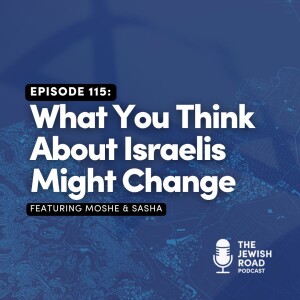
Wednesday Nov 20, 2024
What You Think About Israelis Might Change (featuring Moshe & Sasha)
Wednesday Nov 20, 2024
Wednesday Nov 20, 2024
What You Think About Israelis Might Change
Israelis are often painted as aggressors - heartless warmongers driving their enemies from the land. But what if that narrative is missing the humanity of their story?
In this episode, we sit down with new friends Moshe and Sasha, who share what life really looks like in the middle of the chaos.
Imagine being uprooted from your home, moving four times in one year, all while figuring out how to keep your kids in school and put food on the table. Now, add to that the heartbreak of a tourism business collapsing under the weight of rockets and global fear. This isn’t just geopolitics - it’s survival.
But through it all, a remarkable shift emerges - a Jewish-Israeli perspective of Christians they never expected. Sasha shares her journey of discovering a love and warmth from believers in the West that has transformed her understanding of faith and reconciliation.
It’s a glimpse into how even in war, relationships can heal old wounds. This conversation will challenge what you think you know and leave you with a profound appreciation for the resilience of the Israeli people and the unexpected ways God is moving.
Key Takeaways
Life in Israel is more complicated than the media portrays—this is a story of survival, resilience, and unexpected hope.
Sasha’s perspective on Christians transformed from fear to trust, breaking long-held stereotypes.
Tourism, a cornerstone of Israel’s economy, has been devastated, leaving families scrambling to make ends meet.
God is at work in surprising ways, bringing reconciliation where division once reigned.
Chapter Markers
0:00 – Welcome and Introductions: Meet Moshe and Sasha, two Israelis with incredible stories to share.
2:45 – Moshe’s Journey: From software engineer to tour guide, connecting Christians to the land of the Bible.
9:30 – Sasha’s Story: Discovering her Jewish identity and her surprising encounters with Christian love.
16:20 – Life During War: The struggle of living through constant relocations, rockets, and economic hardship.
29:10 – Arab-Israeli Relations: A nuanced look at the dynamics between Jews and Arabs in Israel.
35:50 – Surprised by Christian Love: How encounters with Christians have reshaped Sasha’s worldview.
42:15 – Jewelry with Meaning: Sasha’s handmade creations that bring the beauty of Israel to the world.
48:30 – Theopolitics and Hope: Israel’s spiritual and global significance explained.
56:00 – Closing Encouragement: Ways to support Israel and bring hope to its people.
Visit BeautifulIsraelStore.com to bring a piece of Israel’s beauty and history into your life. Every purchase helps rebuild lives and sustain hope in the land where biblical stories unfolded - and continue today.
“Sha’alu Shalom Yerushalayim - Pray for the peace of Jerusalem.” Keep the people of Israel in your prayers and hearts.
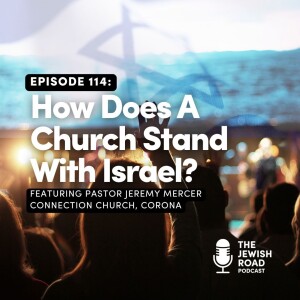
Thursday Nov 14, 2024
How Does A Church Stand With Israel?
Thursday Nov 14, 2024
Thursday Nov 14, 2024
How is it that today’s church can read a Bible rooted in Israel, focused on a Jewish Messiah, and authored by Jewish voices, yet somehow feel disconnected from the Jewish story?
Have we really allowed the narrative of God's chosen people to end 2,000 years ago, when in reality, it’s just getting good?
In this episode, "How Does A Church Stand With Israel?" we dig into the undeniable link between our faith and the ongoing story of Israel - a story still unfolding and intensifying in ways that truly demand our attention.
With longtime friend Pastor Jeremy Mercer of Connection Church in Corona, CA, we look at what it means to stand with Israel as a church. Jeremy shares how his church actively supports and prays for the Jewish people, building a community that stands with Israel not out of politics but as a fulfillment of biblical promises.
Together, we walk through strategies for making Israel a priority in our own churches and why, now more than ever, this matters deeply. On the other side of this conversation, you’ll have a better idea of how to embrace God’s promises for Israel and move from passive awareness to active blessing.
Key Points:
Faith in Action: Pastor Jeremy emphasizes how his church’s love for Israel goes beyond words, actively supporting and praying for the Jewish people.
Scriptural Foundation: The importance of understanding scripture in context, seeing the connection between Old and New Testaments, and grasping the Jewish roots of the faith.
Genuine Connection: Through long-lasting friendships and community support, Pastor Jeremy illustrates the power of relationships in ministry.
Responding to Current Events: Reflecting on the significance of supporting Israel during turbulent times, especially following recent events in Israel.
Teaching Contextually: The need for pastors to preach boldly on Israel's role in God’s plan, countering replacement theology and embracing the full narrative of scripture.
Pull Quotes:
"Without the Jewish story, we miss the full picture of God’s love story for His people."
"Our role as the church is not political but biblical when it comes to standing with Israel."
"Supporting Israel is more than a stance, it’s a journey of faithfulness to God’s promises."
Chapter Markers:
0:10 - 4:30: Introduction: Reconnecting with Pastor Jeremy and His Journey to Ministry
4:30 - 9:15: Faith and Friendship: Growing Up with Israel in Their Hearts
9:15 - 13:50: Biblical Foundations: How Scripture Informs Our Stand with Israel
13:50 - 18:30: Ministry Focus: Connection Church’s Commitment to Israel
18:30 - 23:00: Responding to Current Events: Praying for the Peace of Jerusalem
23:00 - 28:30: Humility in Ministry: How Pastors Can Seek Support and Wisdom
28:30 - 33:20: Supporting Israel Practically: Tips for Churches and Individuals

Monday Nov 04, 2024
Don't Sit This One Out
Monday Nov 04, 2024
Monday Nov 04, 2024
Episode Description
Episode 113: "Don't Sit This One Out: Stand Like Esther with Your Vote"
With division on every front, some believers are stepping back, declaring "Jesus 2024: Our Only Hope." While it's a powerful reminder to keep our eyes on Him, it’s simply not enough to watch from the sidelines. Our faith calls us to be active, engaged, and responsible in our world - not passive spectators. This episode dives into why Christians must participate in the democratic process, even when it feels intimidating or divisive.
Drawing from the story of Esther, Ron and Matt discuss how God’s sovereignty doesn’t relieve us from action; it calls us to it. Esther didn’t sit back and “let go and let God” - she stepped up, even at personal risk, because the fate of her people depended on it. Today, as believers, we’re called to step up in our own way, and voting is one of those ways. The conversation covers not only the importance of this responsibility but also how our choices impact issues that matter deeply to God’s heart, including Israel and the direction of our nation.
Don’t sit this one out. Listen in to be inspired, challenged, and encouraged to show up, speak up, and cast your vote.
Key Takeaways
Faith in Action: How God’s sovereignty works through our responsibility.
The Power of Participation: Why neglecting our right to vote diminishes our influence in a divided world.
Standing with Israel: Understanding Israel’s central role in God’s plan and why it matters to the global Church.
Lessons from Esther: Courage in the face of fear and the willingness to risk for the greater good.
Chapter Markers
00:00 – Introduction: Why Every Vote Counts
02:13 – Division in America and the Christian Response
03:05 – Surprising Stats: 90 Million Christians, 40 Million Don’t Vote
05:27 – God's Sovereignty and Our Responsibility
07:48 – The Story of Esther: Partnering with God
10:11 – Esther's Moment of Courage: “If I perish, I perish”
12:33 – Why Israel Matters: A Lens for Understanding Today’s World
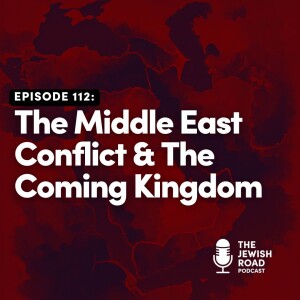
Wednesday Oct 16, 2024
The Middle East Conflict & The Coming Kingdom
Wednesday Oct 16, 2024
Wednesday Oct 16, 2024
It’s a time of uncertainty, a time when the world seems increasingly divided, and the future is unpredictable.
For the Jewish people, the feast of Sukkot (Tabernacles) is a reminder of God's faithfulness in the wilderness. But how do we hold on to that ancient promise in the chaos of today’s world, especially in light of the ongoing conflict in Israel?
This episode of The Jewish Road Podcast is about the deeper significance of Sukkot, the existential battle facing Israel, and how believers can respond in solidarity and prayer.
Key Takeaways:
Sukkot as a Reminder: Sukkot (Feast of Tabernacles) is a reminder of God’s provision and faithfulness to the Israelites during their wilderness journey, symbolizing hope and trust in God’s presence.
Current Events and Biblical Prophecy: The conflict in Israel today is not just another battle; it aligns with biblical prophecies and sets the stage for future events described in Scripture.
Global Antisemitism: The rise of antisemitism worldwide, particularly following the October 7th attacks, mirrors historical patterns, but on a global scale, showing a spiritual battle against God’s people.
The Christian Response: Christians are called to pray for the peace of Jerusalem and stand with Israel, advocating against anti-Israel sentiment and offering tangible support.
God’s Promise of the Kingdom: Sukkot also points forward to a time when God will establish His kingdom on earth, dwelling among His people and bringing peace. This hope anchors believers amidst the chaos.
Chapter Markers:
[00:00 - 03:00] - Introduction and Context: Overview of the current season and the significance of Sukkot for the Jewish community.
[03:01 - 08:00] - Sukkot in the Bible: Discussion on the biblical origins of Sukkot and its meaning as a reminder of God’s faithfulness in the wilderness.
[08:01 - 13:00] - The Modern Battle: Analysis of the October 7th attacks, the global rise of antisemitism, and Israel’s ongoing fight for survival.
[13:01 - 17:00] - Connecting Past and Present: How Sukkot ties into the future kingdom and the fulfillment of God’s promises amidst the current global unrest.
[17:01 - 23:41] - Christian Response and Call to Action: Encouragement for Christians to stand with Israel, pray for peace, and participate in being a light in dark times.










